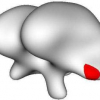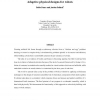115 search results - page 6 / 23 » A Framework of Adaptive Brain Computer Interfaces |
147
click to vote
ICCV
2003
IEEE
16 years 4 months ago
2003
IEEE
In this paper, we overcome a major drawback of the level set framework: the lack of point correspondences. We maintain explicit backward correspondences from the evolving interfac...
114
click to vote
IUI
2005
ACM
15 years 8 months ago
2005
ACM
A task-oriented space can benefit from an augmented reality interface that layers the existing tools and surfaces with useful information to make cooking more easy, safe and effic...
122
click to vote
IJCNN
2008
IEEE
15 years 9 months ago
2008
IEEE
— A major challenge in applying machine learning methods to Brain-Computer Interfaces (BCIs) is to overcome the on-line non-stationarity of the data blocks. An effective BCI syst...
110
click to vote
EMSOFT
2006
Springer
15 years 6 months ago
2006
Springer
Recently, a number of frameworks were proposed to extend interface theory to the domains of single-processor and distributed real-time systems. This paper unifies some of these ap...
119
click to vote
ALIFE
1998
15 years 2 months ago
1998
Creating artificial life forms through evolutionary robotics faces a “chicken and egg” problem: learning to control a complex body is dominated by problems specific to its s...


